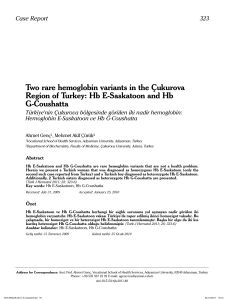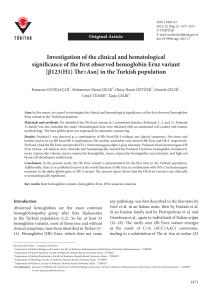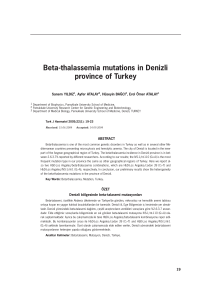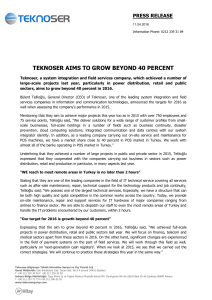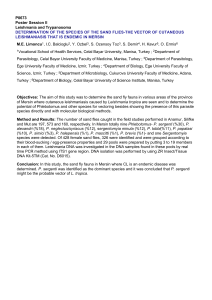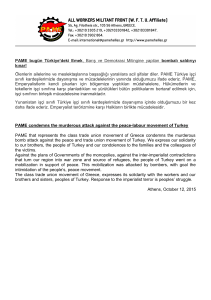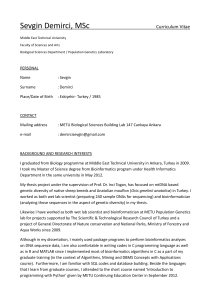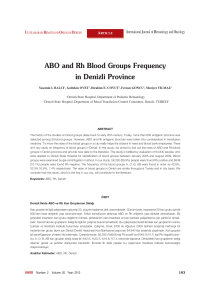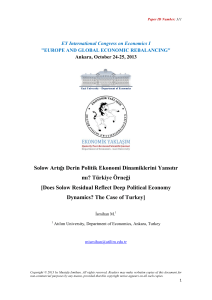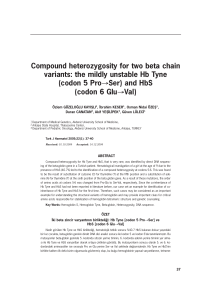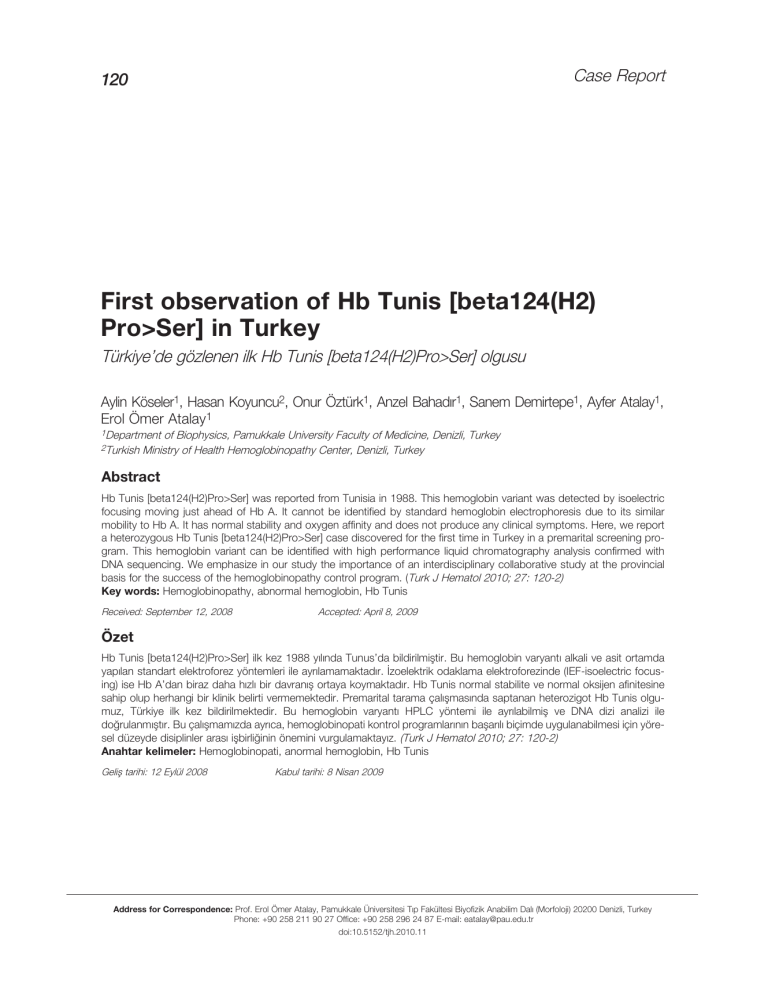
Case Report
120
First observation of Hb Tunis [beta124(H2)
Pro>Ser] in Turkey
Türkiye’de gözlenen ilk Hb Tunis [beta124(H2)Pro>Ser] olgusu
Aylin Köseler1, Hasan Koyuncu2, Onur Öztürk1, Anzel Bahadır1, Sanem Demirtepe1, Ayfer Atalay1,
Erol Ömer Atalay1
1Department
2Turkish
of Biophysics, Pamukkale University Faculty of Medicine, Denizli, Turkey
Ministry of Health Hemoglobinopathy Center, Denizli, Turkey
Abstract
Hb Tunis [beta124(H2)Pro>Ser] was reported from Tunisia in 1988. This hemoglobin variant was detected by isoelectric
focusing moving just ahead of Hb A. It cannot be identified by standard hemoglobin electrophoresis due to its similar
mobility to Hb A. It has normal stability and oxygen affinity and does not produce any clinical symptoms. Here, we report
a heterozygous Hb Tunis [beta124(H2)Pro>Ser] case discovered for the first time in Turkey in a premarital screening program. This hemoglobin variant can be identified with high performance liquid chromatography analysis confirmed with
DNA sequencing. We emphasize in our study the importance of an interdisciplinary collaborative study at the provincial
basis for the success of the hemoglobinopathy control program. (Turk J Hematol 2010; 27: 120-2)
Key words: Hemoglobinopathy, abnormal hemoglobin, Hb Tunis
Received: September 12, 2008
Accepted: April 8, 2009
Özet
Hb Tunis [beta124(H2)Pro>Ser] ilk kez 1988 yılında Tunus’da bildirilmiştir. Bu hemoglobin varyantı alkali ve asit ortamda
yapılan standart elektroforez yöntemleri ile ayrılamamaktadır. İzoelektrik odaklama elektroforezinde (IEF-isoelectric focusing) ise Hb A’dan biraz daha hızlı bir davranış ortaya koymaktadır. Hb Tunis normal stabilite ve normal oksijen afinitesine
sahip olup herhangi bir klinik belirti vermemektedir. Premarital tarama çalışmasında saptanan heterozigot Hb Tunis olgumuz, Türkiye ilk kez bildirilmektedir. Bu hemoglobin varyantı HPLC yöntemi ile ayrılabilmiş ve DNA dizi analizi ile
doğrulanmıştır. Bu çalışmamızda ayrıca, hemoglobinopati kontrol programlarının başarılı biçimde uygulanabilmesi için yöresel düzeyde disiplinler arası işbirliğinin önemini vurgulamaktayız. (Turk J Hematol 2010; 27: 120-2)
Anahtar kelimeler: Hemoglobinopati, anormal hemoglobin, Hb Tunis
Geliş tarihi: 12 Eylül 2008
Kabul tarihi: 8 Nisan 2009
Address for Correspondence: Prof. Erol Ömer Atalay, Pamukkale Üniversitesi Tıp Fakültesi Biyofizik Anabilim Dalı (Morfoloji) 20200 Denizli, Turkey
Phone: +90 258 211 90 27 Office: +90 258 296 24 87 E-mail: [email protected]
doi:10.5152/tjh.2010.11
Köseler et al.
Hb Tunis case in Turkey
Turk J Hematol 2010; 27: 120-2
Introduction
Case Report
mAU
Hd Tunis
HdA0
Many hemoglobin variants other than Hb S have been
reported from Turkey [1,2]. In the Denizli province of Turkey,
the most frequent hemoglobin variants are Hb D-Los Angeles
and Hb G-Coushatta [3]. In addition to the reviewed hemoglobin variants in Turkey, Hb D-Ouled Rabah, Hb Yaizu and Hb
Beograd have also been reported from the Denizli province
[4-6]. Hb Tunis [beta124(H2)Pro>Ser] was reported from
Tunisia by Mrad et al. in 1988 [7]. This hemoglobin variant was
detected by isoelectric focusing (IEF) moving just ahead of Hb
A. It has normal stability and oxygen affinity and does not
cause any clinical symptoms. It is also not detectable by conventional hemoglobin electrophoresis. The Hemoglobinopathy
Control Program has been applied in our province since 2005
in collaboration with the Turkish Ministry of Health Denizli
Hemoglobinopathy Center and Pamukkale University Medical
Faculty, leading to prenatal diagnosis in the cases of pregnancies at risk. We report herein the first observation of Hb Tunis
[beta124(H2)Pro>Ser] hemoglobin variant in Turkey from the
Denizli province determined during the premarital screening
program.
25
20
HdA1c
HdA2
15
10
5
0
0
2
121
4
6
8
We report in this study identification of the heterozygous
Hb Tunis [beta124(H2)Pro>Ser] in a 21-year-old male living in
the Denizli province, located in the Aegean region of Turkey.
Written informed consent was obtained for the laboratory tests
and DNA analysis from the proband, and the sample was
deposited at the DNA Bank of the Department of Biophysics
as an anonymous sample. Hemoglobin electrophoresis at
alkaline and acid pH, DE-52 column chromatography, and
non-radioactive fluorescence-based DNA sequencing as previously published were performed [8]. For the sequencing of the
beta globin gene exon 3, the forward primer PAM600 (5’-CAA
TGT ATC ATG CCT CTT TGC ACC-3’) and reverse primer
PAM603 (5’-CAC TGA CCT CCC ACA TTC CC-3’) were used.
High performance liquid chromatography (HPLC) was obtained
with BioRad Variant II system, USA. Blood cell counts were
done with Beckman Coulter AcT10 instrument, USA.
The hemoglobin variant could not be identified by alkaline
or acid pH in agarose based electrophoresis and behaved like
Hb A. Results of analysis of the red blood cell parameters were
as follows: Hb 15.6 g/dl, RBC 5.50 106/mm3, Hct 47.7%, MCV
87.0 fL, MCH 28.3 pg, MCHC 32.7 g/dl, and RDW 12.6%. In
DE-52 microcolumn chromatography, Hb A2 was eluted (3.1%)
but Hb X could not be eluted with Hb S buffer (0.2 M glycine /
0.014 M NaCl / 0.01 % KCN). Changing buffer content in the
NaCl concentration does contribute to the elution of Hb X. The
Hb variant produces a double peak at the Hb A window slightly
slower than Hb A in HPLC analysis, as shown in Figure 1.
According to the HPLC results, the Hb ratios for Hb A0, Hb X,
Hb A2 and Hb A1c were 45.71%, 48.84%, 3.09% and 2.36%,
respectively. DNA sequencing revealed the hemoglobin variant
as a mutation at beta globin gene exon 3 codon 124
(CCA>TCA, Pro>Ser), as shown in Figure 2.
min
Figure 1. HPLC result of heterozygous Hb Tunis case
Codon 124
70
C A C C Y C A C C A G T G CA
Figure 2. DNA sequencing of hemoglobin AX (beta 124, CCA>TCA, Y=C/T)
Discussion
In this study, Hb Tunis was identified by DNA sequence
analysis, which confirmed the C-to-T mutation at the beta globin gene codon 124. Hb Tunis was reported once in the world
populations by Mrad et al. [7] from Tunisia. To the best of our
knowledge, our case is the second observation in the world
population and is the first reported case in Turkey. This mutation causes the replacement of proline residue into serine.
Proline has no ionizable groups, and all conformations like cisand trans- are almost isoenergetic. When proline is in the
protein structure, it cannot donate a hydrogen bond for stabilizing the protein structure. On the other hand, serine is a neutral polar molecule that has a tendency to remain on the surface of the proteins. The replacement proline into serine at beta
globin codon 124 does not change its standard electrophoretic characteristics at alkaline and acid medium. Only IEF
electrophoresis can detect Hb Tunis [beta124(H2)Pro>Ser] as
a slightly faster moving band compared to Hb A [7] due to the
slight difference in the isoelectric points of the proline and serine residues. The presence of serine also changes the chromatographic behavior of the hemoglobin molecule slightly. This
122
Köseler et al.
Hb Tunis case in Turkey
change cannot be observed in DE-52 microcolumn chromatography, but it can be detected by the HPLC system, which
has resolution capacity. In the HPLC system, we observed a
slightly slower peak at the Hb A window. This behavior is due
to the weak interaction of the serine residue with the HPLC
column matrix. In the HPLC system, the parameters should be
standardized very carefully. If the experimental HPLC analysis
parameters are not controlled and standardized, such hemoglobin variants can be bypassed easily.
Beta globin gene codon 124 resides in the external region
of the hemoglobin molecule and is located in the α1β1 contact
region of the hemoglobin tetramer. During transition of the
hemoglobin molecule from oxy-form to deoxy-form, the relative
displacement of the β-chain to the α-chain is greater at the
α1β2-contact than at the α1β1-contact [9]. Therefore, it is
expected that the effect of the mutation on the structure and
function the hemoglobin molecule is absent or very small and
thus does not manifest in clinical symptoms. This heterozygous Hb Tunis case is an apparently healthy male. The place
of the codon 124 with its characteristic features confirms this
issue. Since homozygous Hb Tunis and other combinations
with alpha and beta thalassemia are not yet reported, the
clinical significance of this mutation remains unclear in such
conditions.
Concerning the historical background, North African populations were affected by different Mediterranean populations
due to the population movements. The Turkish influence was
particularly notable in Tunisia and Algeria during the 14th-19th
centuries [10]. Although molecular genetic data like beta globin
gene cluster haplotypes is absent, Hb Tunis could have been
introduced in the Denizli province gene pool due to these historical population movements.
In premarital screening programs, the nature of any hemoglobin variant detected by HPLC that is of potential clinical
relevance should be confirmed by alternative techniques [11].
Premarital screening leading to prenatal diagnosis of the
hemoglobinopathies has been applied in our province since
2004. Identification of the hemoglobin variants poses problems
in the premarital control program in Denizli province due to the
heterogeneous structure of the province. According to the
results of our registered cases, Hb D-Los Angeles and Hb
G-Coushatta were observed frequently [3]. Hb Beograd, Hb
Yaizu and Hb D-Ouled Rabah have also been reported from
our province [4-6]. We would also like to emphasize the importance of an interdisciplinary collaborative study at the provincial
basis to facilitate the success of the hemoglobinopathy control
program.
In conclusion, we report Hb Tunis [beta124(H2)Pro>Ser] for
the first time in Turkey from the Denizli province. We emphasize
that the exact identification of many hemoglobin variants can
be easily bypassed with the application of limited laboratory
techniques like standard hemoglobin electrophoresis and even
with HPLC methods. The standardization of the protocols and
Turk J Hematol 2010; 27: 120-2
algorithmic approach used in hemoglobinopathy control programs is another important issue to be addressed.
Acknowledgements
The authors are grateful to the staff of the Turkish Ministry
of Health Denizli Hemoglobinopathy Center and MSc student
of the Biophysics Department, Çağıl Coşkun, for their valuable
contributions. This work was supported by the Pamukkale
University Research Fund Projects (Nos. 2002TPF017,
2005SBE001, 2005SBE002, 2006SBE004 and 2006TPF001).
Conflict of interest
No author of this paper has a conflict of interest, including
specific financial interests, relationships, and/or affiliations relevant to the subject matter or materials included in this manuscript.
References
1.
2.
3.
4.
5.
6.
7.
8.
9.
10.
11.
Altay Ç. Abnormal hemoglobins in Turkey. Turk J Hematol
2002;19:63-74.
Akar E, Akar N. A review of abnormal hemoglobins in Turkey.
Turk J Hematol 2007;24:143-5.
Atalay EÖ, Koyuncu H, Turgut B, Atalay A, Yıldız S, Bahadir A,
Köseler A. High incidence of Hb D-Los Angeles [β121(GH4)
Glu>Gln] in Denizli province, Aegean region of Turkey.
Hemoglobin 2005;29:307-10.
Köseler A, Bahadır A, Koyuncu H, Atalay A, Atalay EÖ. First
observation of Hb D-Ouled Rabah [beta19(B1)Asn>Lys] in the
Turkish population. Turk J Hematol 2008;25:51-3.
Atalay EÖ, Atalay A, Koyuncu H, Öztürk O, Köseler A, Özkan A,
Demirtepe S. Rare hemoglobin variant Hb Yaizu observed in
Turkey. Med Princ Pract 2008;17:321-4.
Atalay A, Koyuncu H, Köseler A, Özkan A, Atalay EÖ. Hb
Beograd [β121(GH4)Glu>Val, GAA>GTA] in the Turkish population. Hemoglobin 2007;31:491-3.
Mrad A, Blouquit Y, Lacombe C, Blibech R, Arous N, Bardakdjian
J, Kastally R, Rosa J, Galacteros F. Hb Tunis [alpha 2 beta 2
124(H2)Pro>Ser], a new beta chain variant identified by HPLC.
Hemoglobin 1988;12:23-30.
Köseler A, Atalay A, Koyuncu H, Turgut B, Bahadir A, Atalay EÖ.
Molecular identification of a rare hemoglobin variant, Hb J-Iran
[beta77(EF1)His>Asp], in Denizli province of Turkey. Turk J
Hematol 2006;23:164-6.
Fujita S. Oxygen equilibrium characteristics of abnormal hemoglobins: Hirose (α2β237Ser), L-Ferrara (α247Glyβ2), Broussais (α290Asnβ2)
and Dhofar (α2β258Arg). J Clin Invest 1972;51:2520-9.
Chami B, Blouquit Y, Bardakdjian-Michau J, Riou J, Wajcman H,
Rosa J, Galacteros F. Hemoglobin variants in North Africa.
Hemoglobin 1994;18:39-51.
British Committee for Standards in Hematology. Guideline: The
laboratory diagnosis of hemoglobinopathies. Br J Hematol
1998;101:783-92.

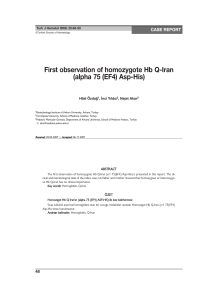
![First observation of Hb D-Ouled Rabah [beta19(B1)Asn>Lys] in the](http://s1.studylibtr.com/store/data/003346881_1-fc6465a17750760535fb52bbef4ddf81-300x300.png)
